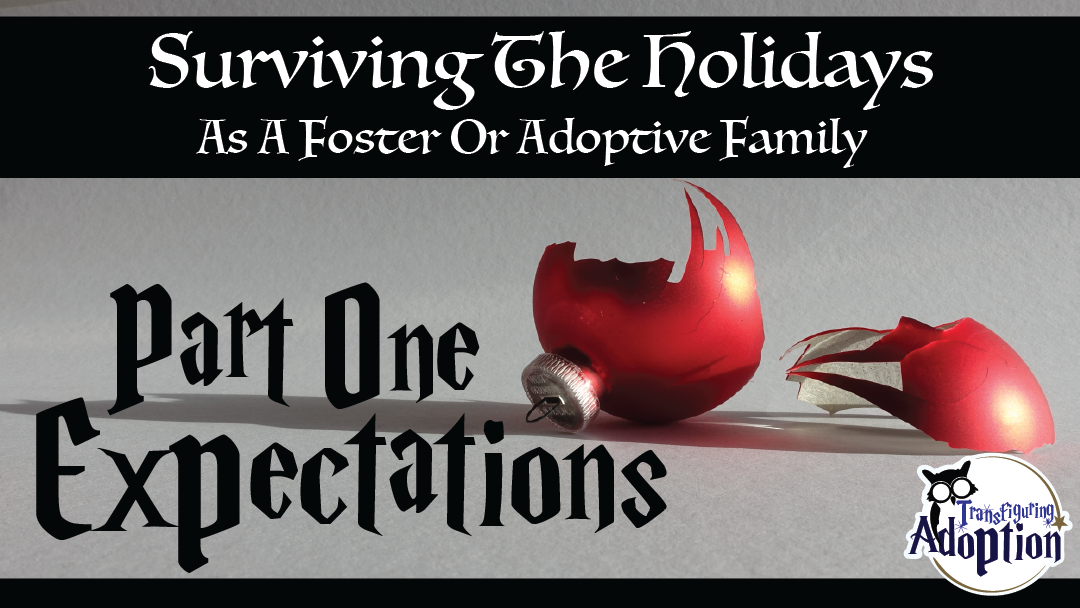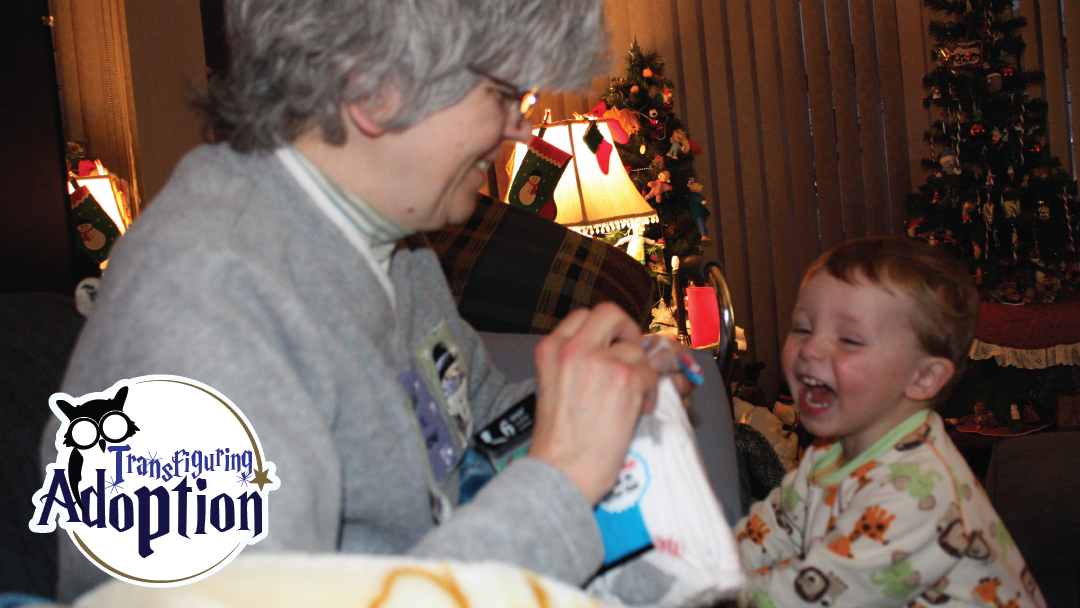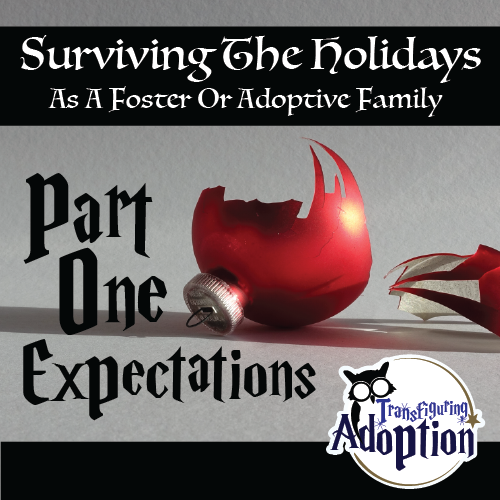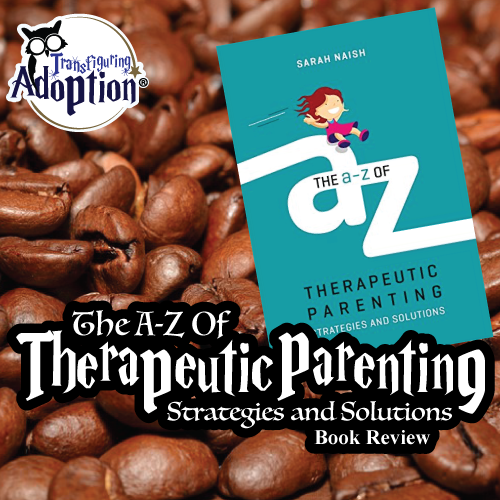The last few months have flown by, and I cannot believe the holiday season is upon us! The holidays can be an extremely challenging time for foster and adoptive families. Not only do we get out of our usual routines, which is hard on our kids, but the holidays come with multiple confusing and complex emotions for everyone in the family to process. Excitatory chemicals released in the brain are the same during both traumatic and joyous experiences. Therefore, meltdowns, temper tantrums, withdrawal, and more are pretty well to be expected unless you are very intentional about putting into place safeguards to prevent such events. Today is the first of a 5-part series about ways we have found over the years to confront the challenges the holidays present.
Foregoing Expectations
I recently was at a conference during which the main speaker said something so important which I will blog about in depth soon in regards to fostering and adopting but which is also vital to the discussion of holidays as well. Beth Guckenberger, cofounder of Back2Back Ministries, stated that “Expectations equal premeditated resentment.” When our expectations are not met, the emotions are certainly difficult to deal with, and this leads to resentment of all sorts. For kids who have not totally learned how to deal with their emotions or who do not even fully know what emotions are or how they affect them, undesirable behaviors are sure to result which can set off a chain of downward spiraling events.
The holidays are a time when desires and longings, along with expectations (whether good or bad), are often at the forefront of our minds. I, even as an adult, tend to always have expectations for how a holiday, vacation, or big day should be. I picture it in my head. Kids also have expectations for how holidays should be. They may think that because they ask for a gift, they will automatically get it. They may have an idea of the schedule for the day in their head which they may have created or assumed. They could expect to see certain people.
When I have a picture of a special day with family in my head that gets sabotaged by a behavior, I find myself struggling. A true perfectionist, I often find myself stuck, staring at the picture of my perfect day which exists in my head and focusing on what I long for life to look like. This results in anger and ultimately resentment, which ends in conflict and not quite the bonding experience we all long for holidays and other big days to be. For our kids, they may not even know and be able to process what’s happening when they have unmet expectations, but their behavior shows it!
The following five steps will help your family avoid some common holiday crises:
- Explore everyone’s expectations.
The best way to deal with behaviors caused by unmet expectations is to prevent expectations from being unmet in the first place, and the only way to do that is to find out what everyone’s expectations are. Sit down before special days and discuss what everyone thinks will happen. - Set realistic expectations.
We all need to be realistic and help our kids be realistic about what to expect. Not everyone will show up to a party. You won’t get everything on your wish list. We can’t ride every amusement park ride before one of the kids is just “done” for the day. A child with special needs or trauma may not be able to keep themselves regulated for a whole party. Those really large get togethers may be too much for our kids, so we may not make it to desert or to midnight on New Year’s Eve.
- Try to stay as near to normal routines as possible.
Kids who have been adopted or are/were in foster care do the best when they are in a consistent routine. They know what to expect, feel a little control over their life, and in return, are able to exercise better control over their behavior. We learned early on that keeping our kids out or up later than their bedtime is usually not worth it. We WILL pay for it later. Some rules/boundaries move a little during special days, but we try not to change too much up because, again, we pay for it. It confuses the kids when rules/boundaries are not consistent. There are days when we feel sad/frustrated/angry/whatever because we see other families and friends with their “typical” kids enjoying special days in ways we can’t as a family, but it’s important to remember that this stage in our kids’ lives is temporary. One day (maybe when we’re in an old folks’ home) we’ll be able to celebrate holidays in more “typical” ways. For now, you may have to watch a New Year’s celebration in another part of the world where they are hours ahead, and you can bang pots and pans or do some quiet celebratory action if you have kids who can’t handle loud noises, pretend it’s midnight (because it is somewhere!) and send the kids on to bed. The more we help our kids feel safe and help them succeed in social situations, the more likely they are to find the healing needed to see the progress needed to move back from our “new normal” as a family to what we would consider “normal” family activities. - Let children know what’s coming.
Children who have experienced trauma, grief, or loss often feel no control over anything. They very rarely have any say in the events in their lives. This leads to behaviors that are often rooted in their search to exercise control. Letting children in on the plans and schedule for the day helps them feel safe and know what to expect. You can do a written out schedule, a picture schedule for kids that don’t read, or little cards with activities put in the order that they will happen in (possibly with a wild card for the unexpected). - Teach kids how to deal with disappointment.
This is another area where preemptive action needs to be taken. When they are upset, their brain is not able to process learning. At a time when they are calm and content, discuss what to do when their expectations aren’t met, when they experience disappointment. Talk about the feelings and brainstorm ways to handle them in an acceptable manner. What do you do if you don’t get the present you wanted? What if you don’t like the sweater grandma knitted for you? What do you do if there is no more pumpkin pie left when you get to desert time?
One of our most fun family vacations last year was one of our most successful because we preempted the trip with lots of preparation for what disappointments may occur. We knew it was going to be a whirlwind, and the kids would have unmet expectations. We nicknamed it the “unfair trip” and asked each one of them if they wanted to opt out and said even one dissent would end in a family decision to stay home. Everyone said they would rather go. We went over and over what things might happen that they might feel upset by and reminded them over and over that no matter what it would be more fun than staying home. We had a blast. Vacations were not always that way. We hadn’t even made it to our destination the first trip we all six made together when we thought we would never go on another vacation because nothing was happening as expected.
By examining expectations, setting realistic expectations, and brainstorming ways in which kids can experience disappointment, kids will feel more prepared and will be more likely to succeed. Success breeds greater confidence and more success. And don’t forget to do this all for yourself. We can hardly ask our kids to control their emotions and disappointments at unmet expectations when we ourselves cannot!
Stay tuned for the upcoming posts in this series—Surviving Holidays as a Foster or Adoptive Family:
[Part 2-Honoring Feelings]
[Part 3-Balancing Relationships]
[Part 4-Traditions]
Part 5-Managing Emotions
Discussion Questions:
- Do you find yourself having expectations for the holidays or special events, only to suffer disappointment when they don’t come to pass?
- What can you do to ensure you have realistic expectations?
- Do you ever find yourself dwelling on dreams and forgetting to live in the here and now? What do you find helps you to come back to the present?
- Does anyone in your house (knowingly or unconsciously) sabotage holidays or special events?
Now It’s Your Turn:
Be sure to share your thoughts below. Your answers will help other kids and parents too.




The Holy Mess (@SaraBorgstede)
This is a fantastic series! So important, and all the points you bring up are spot on. Our children with special needs (who are adopted) struggle with holidays, and heck, I do too, and you are exactly right that I need to change my expectations. I’ve learned to let a lot go over the years and it’s helped tremendously. We don’t need a picture-perfect holiday. It’s really okay. Thanks for these insights. What I’m finally coming to understand is that good things are not good if they are too much. Period.
Margie Fink
Thanks! 🙂 It’s so true that too much of a good thing can quickly turn into drama and trauma in our families. I know Darren and I need to be reminded ourselves when we’ve pushed too long or far in an attempt to have fun as a family, or we remember when someone’s mid-meltdown.
Our picture perfect as special needs, foster, and/or adoptive families really just looks different than other families. We have to lower the bar for the kids and ourselves so we can all succeed, connect, and go to sleep knowing we’re in a better place than we were before.
Pingback: 4 Things We Learned Vacationing with Foster and Adoptive Children - Transfiguring Adoption